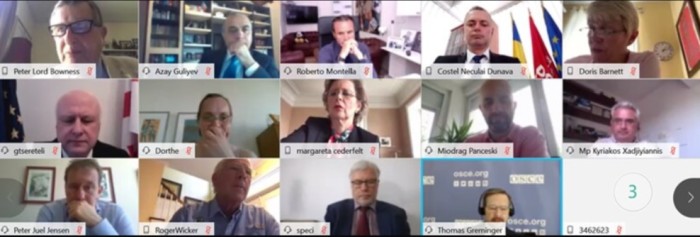WSi News2020-06-10 10:47:59
Parliamentarians, experts and officials from UN and OSCE meet online to discuss counter-terrorism in an era of pandemic
While much of the international community’s attention is currently focused on fighting the COVID-19 pandemic, traditional threats such as terrorism and violent extremism are as relevant as ever and must remain high on the international agenda, participants said at the OSCE Parliamentary Assembly’s seventh meeting of the Ad Hoc Committee on Countering Terrorism (CCT) today.
The meeting, held in an online format, was addressed by CCT Chair Reinhold Lopatka (Austria), Under-Secretary-General of the United Nations Office of Counter-Terrorism Vladimir Voronkov, Chair of the OSCE’s Security Committee and Head of UK Delegation to the OSCE Neil Bush, and Chelsea L. Daymon, an independent expert on terrorism and political violence.
Parliamentarians discussed how crisis situations such as the COVID-19 pandemic can aggravate threats by offering new opportunities for terrorist groups to prosper and achieve their goals, as the attention of the world has shifted elsewhere. The impact of economic disruption related to the COVID-19 pandemic could lead to greater radicalization and fuel the rise of extremism, while some are exploiting the crisis to advance extremist narratives, disseminate conspiracy theories, promote hate speech and spread propaganda, it was noted.
“The global crisis caused by COVID-19 has exacerbated existing grievances and protracted conflicts and led to the emergence of new terrorist trends,” said Under-Secretary-General Voronkov. “ISIL, Al-Qaida and their supporters have expanded the dissemination of violent ideologies and are intensifying recruitment efforts, both online and offline.”
Other violent extremists are also exploiting the fear and anxiety caused by the pandemic to spread misinformation and further their ideologies, according to Voronkov, who welcomed the work of the OSCE PA in addressing these issues. “We need strong partnerships, such as the one we have with the OSCE and its Parliamentary Assembly,” Voronkov said.
In his opening remarks, CCT Chair Lopatka noted that the uncertainty caused by COVID-19 could trigger dangerous dynamics and fuel violent extremism.
“Extremists exploit the crisis for their despicable purposes, and violent protests and even attacks could result from dangerous conspiracy myths,” Lopatka said. “Right-wing extremists increasingly propagate hatred of foreigners, especially Asians, and also spread the anti-Semitic myth of a Jewish world conspiracy. Left-wing extremists blame the capitalist system for causing the crisis, reject governmental surveillance and foment social unrest.”
Neil Bush spoke about the importance of promoting a whole-of-society approach to counter-terrorism, which would involve utilizing all the tools of civil society and governments, as well as the business community and educational institutions. Chelsea L. Daymon said that terrorists are taking advantage of the fact that the focus of governments is currently on the COVID-19 pandemic. Extremists of various stripes are exploiting the situation and offering their own narratives to explain the pandemic, she said.
In the discussion, members spoke about the importance of distinguishing terrorist movements from social movements, with very clear legal distinctions. Designating activists as terrorists is dangerous, it was stressed, and should be avoided. The importance of preserving fundamental freedoms while countering terrorism was also emphasized, as well as how to address the question of dealing with returning foreign terrorist fighters.
Committee members also discussed ongoing work of the CCT, including a Parliamentary Web Dialogue scheduled for late June, an upcoming co-ordination meeting with UNOCT, and joint activities with other institutions of the OSCE. Parliamentarians explored ways to address recent terrorism trends and consolidate the OSCE PA’s network of strategic partnerships.
Also addressing the meeting were PA President George Tsereteli, Secretary General Roberto Montella, and Alena Kupchyna, the OSCE Co-ordinator for Activities to Address Transnational Threats.
The Ad Hoc Committee on Countering Terrorism was established by the OSCE PA’s Standing Committee on 5 July 2017 at the 26th Annual Session in Minsk. In consultation with relevant partners, the Ad Hoc Committee assesses terrorism trends in the OSCE region to identify priority areas of engagement for the OSCE PA, aiming to advance a parliamentary contribution to the global fight against terrorism and violent extremism.
For more on the work of the OSCE PA on counter-terrorism, please click here
